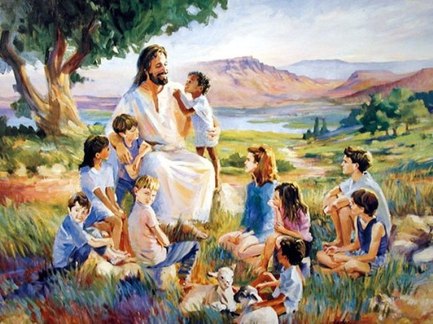 Reading 1, Ezekiel 18:1-10, 13, 30-32" Responsorial Psalm, Psalms 51:12-13, 14-15, 18-19 Gospel, Matthew 19:13-15 13 Then people brought little children to him, for him to lay his hands on them and pray. The disciples scolded them, 14 but Jesus said, 'Let the little children alone, and do not stop them from coming to me; for it is to such as these that the kingdom of Heaven belongs.' 15 Then he laid his hands on them and went on his way. REFLECTION:Let the little children come to me." We have already heard different reflections on today's Gospel. Every so often preachers exalt the characteristics children have that made Jesus say that we must be like little children to be able to enter the Kingdom. Perchance, it is their innocence that touches God so much. However, such is what many adults have lost in time.
Several years back, during election period, a television network made an advertisement urging Filipinos to vote for the right persons in government offices. The message went across the public space magnificently when they put a little girl's face on the posters saying "Boto mo, kinabukasan ko..." This advertisement must have moved every person who saw it in billboards and posters everywhere around the country. The picture captured best the little girl's innocence while asking the people to think of every Filipino child as they vote.
There is no doubt that in God's eyes we will always be his little children. But the question is, "Do we still have the hearts of children?" This is another story. Yes, we are all children in the sight of the One who made us. But do we still have that something that makes us like a child is the question now.
Brothers and sisters, let us reflect on today's Gospel and continuously pray that we may still possess the heart of a child. Because it is in the simplicity of such a heart that God is aroused and pleased. May our Mother Mary interceded for us as we remember and relive our dependence on God's loving mercy and grace.
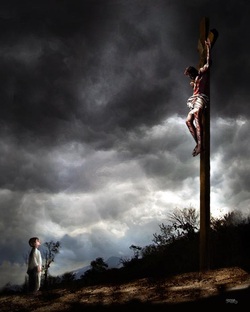 Reading 1, Ezekiel 16:59-63 Responsorial Psalm, Isaiah 12:2-3, 4, 5-6 Gospel, Matthew 19:3-12 3 Some Pharisees approached him, and to put him to the test they said, 'Is it against the Law for a man to divorce his wife on any pretext whatever?' 4 He answered, 'Have you not read that the Creator from the beginning made them male and female 5 and that he said: This is why a man leaves his father and mother and becomes attached to his wife, and the two become one flesh? 6 They are no longer two, therefore, but one flesh. So then, what God has united, human beings must not divide.' 7 They said to him, 'Then why did Moses command that a writ of dismissal should be given in cases of divorce?' 8 He said to them, 'It was because you were so hard-hearted, that Moses allowed you to divorce your wives, but it was not like this from the beginning. 9 Now I say this to you: anyone who divorces his wife -- I am not speaking of an illicit marriage -- and marries another, is guilty of adultery.' 10 The disciples said to him, 'If that is how things are between husband and wife, it is advisable not to marry.' 11 But he replied, 'It is not everyone who can accept what I have said, but only those to whom it is granted. 12 There are eunuchs born so from their mother's womb, there are eunuchs made so by human agency and there are eunuchs who have made themselves so for the sake of the kingdom of Heaven. Let anyone accept this who can.' REFLECTION:
Jesus came not to destroy the law but to fulfill it (Mt 5:17). This is a statement that bewildered the Jewish teaching authorities of Jesus' time. They had a hard time reconciling the seemingly new teachings Jesus was putting forward in contrast to their 613 laws. There was no way for them to comprehend him if they would only stick to the laws they have multiplied out of the ones given to Moses. And the Gospel reading today manifests the apprehension the law authorities have towards Jesus regarding the laws.
Jesus boldly upholds the sanctity of marriage. Marriage can be drawn up from the Old Testament up to the New Testament. This, in time, evolved into an ecclesial Sacrament due to its divine institution as seen in Scriptures.
When tested by the Pharisees about marital questions, Jesus stood still and unshaken based on His Father's command. Jesus, as the Son of God, cannot be mistaken in interpreting the law. He is the Son of God. He was there when the law was given to Moses. He was even there when the first couple was created. Why and How? Simply because He is the Word through which everything was made (cf. Jn 1:1). He is simply the Christ, the Anointed One.
The Sacrament of Marriage is so important because here a couple is given the chance to encounter God in the most unique way where the family is built. However, presumed to have love in the first place, love between two individuals ought to be the reason for their coming together and deciding to enter into a lifetime partnership before God and man. As they swear to each other and promise to love each other for the rest of their lives with full consent, marriage as a Sacrament is validly contracted. And its consummation brings it to perfection. This is the beauty of this Sacrament. Above all, we must not forget the indissolubility of the couple's partnership. This elevates marriage into a Sacrament as God is involved in this covenant.
Marriage is a Sacrament received not by all. Among the many other reasons for staying single, I suppose the greatest is to remain single and chaste for the sake of the Kingdom. I do admire those who are single and chaste, yet faithfully dedicating their lives in the service of God. This noble intention perchance has been motivated by their love for God. And for the clerics and vowed religious, to be chaste and single for the sake of the Kingdom are challenges we have received from Him. Nevertheless, to be able to respond to God is a gift given to us by Him who has challenged us. Grace abounds the most amidst life's most difficult times.
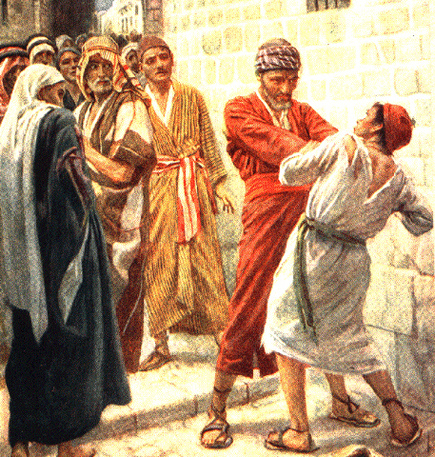 "The Unforgiving Servant"Gospel, Matthew 18:21--19:121 Then Peter went up to him and said, 'Lord, how often must I forgive my brother if he wrongs me? As often as seven times?' 22 Jesus answered, 'Not seven, I tell you, but seventy-seven times. 23 'And so the kingdom of Heaven may be compared to a king who decided to settle his accounts with his servants. 24 When the reckoning began, they brought him a man who owed ten thousand talents; 25 he had no means of paying, so his master gave orders that he should be sold, together with his wife and children and all his possessions, to meet the debt. 26 At this, the servant threw himself down at his master's feet, with the words, "Be patient with me and I will pay the whole sum." 27 And the servant's master felt so sorry for him that he let him go and cancelled the debt. 28 Now as this servant went out, he happened to meet a fellow-servant who owed him one hundred denarii; and he seized him by the throat and began to throttle him, saying, "Pay what you owe me." 29 His fellow-servant fell at his feet and appealed to him, saying, "Be patient with me and I will pay you." 30 But the other would not agree; on the contrary, he had him thrown into prison till he should pay the debt. 31 His fellow-servants were deeply distressed when they saw what had happened, and they went to their master and reported the whole affair to him. 32 Then the master sent for the man and said to him, "You wicked servant, I cancelled all that debt of yours when you appealed to me. 33 Were you not bound, then, to have pity on your fellow-servant just as I had pity on you?" 34 And in his anger the master handed him over to the torturers till he should pay all his debt. 35 And that is how my heavenly Father will deal with you unless you each forgive your brother from your heart.' 1 Jesus had now finished what he wanted to say, and he left Galilee and came into the territory of Judaea on the far side of the Jordan. Reflection:" Pagpapatawad", this is what Christ is teaching us through the parable of the unforgiving servant. Matthew beautifully puts into writing the message on "forgiveness" when Jesus speaks about forgiving "seventy times seven times". (This was also mentioned in Luke 17:4)
Ang Ebanghelyo natin sa araw na ito ay tunay na titimo sa kaibuturan ng ating puso. Isa na yata ako sa maraming tinatamaan sa mensaheng hatid ni Kristo tungkol sa pagpapatawad. Ipinapakita sa atin ng Panginoon ang kahalagaan ng pagpapatawad at ang maidudulot nito sa ating pagkatao.
Walang hanggang pagpapatawad ang ibig sabihin ni Kristo nang wikain niyang, "Hindi ko sinasabing makapito, kundi pitumpung ulit pa nito." Ito na yata ang isa sa pinakamahirap isabuhay bilang Kristiano. Kadalasan nagdarasal tayo ng walang puknat upang humingi ng tawad sa Diyos para sa ating mga pagkakasala ngunit tayo mismo ay hindi marunong magpatawad. Ito ay nakalulungkot na realidad sa karamihan ng mga Kristiano.
Kahapon lamang ay may nabasa ako sa internet na tungkol sa isang babaing mahigit na 50 taong mabilanggo sa Amerika sa salang pagpapatay sa batang inaalagaan nito. Matapos ang mahabang panahon nang pagkakakulong ay binigyan siya ng "parol". Sabi ng matanda ay nagsimulang magbago ang kanyang buhay nang makatanggap siya ng liham mula sa ina ng batang napaslang. Sa sulat na ito ay inilahad ng ina ng bata ang kanyang naramdaman matapos ang mahigit 19 na taon buhat ng mamatay ang kanyang anak. Sa dulo ng sulat ay nakasaad na pinatatawad na ng inang si Erma si Bitty. Ayon kay Bitty, ito ang nakapagpabago nang kanyang buhay. Dahil sa pagpapatawad ng ina sa kanya ay nakawala siya sa kinasasadlakang kawalan sa buhay.
Tunay na may kapangyarihan ang pagpapatawad. Dahil rito ay isinugo ng Ama ang kanyang Anak upang tayo ay maligtas sa kasalanan. Tulad ng pagpapatawad ng ina ng batang napaslang kay Bitty, ang pagpapatawad ng Ama ay nakapagpabago ng ating buhay.
Mga kapatid, hindi man madali ang magpatawad ay walang pagod nating subukang maibahagi ito sa mga nagkasala sa atin katulad ng pagpapatawad na tinatanggap natin mula sa Diyos sa tuwing dudulog o lalapit tayo sa Sakramento ng Pakikipagkasundo. Alalahanin nating nararapat na tayo ay magpatawad sapagkat tayo ay pinatawad at patuloy na pinatatawad kung tayo lamang ay hihingi ng kapatawaran mula sa Panginoon.
Fray Aimark P. Asor, OSA, Peccator est. Orate pro eo.
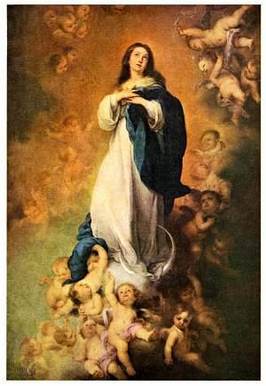 Readings
Reading I: Revelation 11: 19, 12: 1-6, 10
Reading II: Corinthians 15: 20-26
Gospel: Luke 1: 39-56
Gospel Reading:
Mary Visits Elizabeth
39 At that time Mary got ready and hurried to a town in the hill country of Judea, 40 where she entered Zechariah’s home and greeted Elizabeth. 41 When Elizabeth heard Mary’s greeting, the baby leaped in her womb, and Elizabeth was filled with the Holy Spirit. 42 In a loud voice she exclaimed: “Blessed are you among women, and blessed is the child you will bear! 43 But why am I so favored, that the mother of my Lord should come to me? 44 As soon as the sound of your greeting reached my ears, the baby in my womb leaped for joy. 45 Blessed is she who has believed that the Lord would fulfill his promises to her!”
Mary’s Song
46 And Mary said:
“My soul glorifies the Lord
47 and my spirit rejoices in God my Savior,
48 for he has been mindful of the humble state of his servant.
From now on all generations will call me blessed,
49 for the Mighty One has done great things for me--
holy is his name.
50 His mercy extends to those who fear him,
from generation to generation.
51 He has performed mighty deeds with his arm;
he has scattered those who are proud in their inmost thoughts.
52 He has brought down rulers from their thrones
but has lifted up the humble.
53 He has filled the hungry with good things
but has sent the rich away empty.
54 He has helped his servant Israel,
remembering to be merciful
55 to Abraham and his descendants forever,
just as he promised our ancestors.”
56 Mary stayed with Elizabeth for about three months and then returned home.
Reflection:
As we celebrate the Solemnity of our Blessed Mother's Assumption let us try to think of all the things God has wrought in our lives.
Today's Gospel reading lets us experience and share with Mary's joy as she proclaims the wonderful things God has done in her life and that of Israel's.
Mgkikita natin sa pagbubunyi ni Maria ang walang hanggang pagmamahal ng Panginoon s kanyang bayang hinirang. Ang pagmamahal na ito rin ang dahilan kung bakit ipinadala Niya ang kanyang bugtong na Anak upang tubusin ang sansinukob mula sa kinasasadlakan nitong kasalanan.
Labis ang pagmamahal ng Diyos sa tao. Bakit nga ba? Hindi ko rin alam ang dahilan nang labis niyang pagsinta sa atin. Ito ang hiwaga sa relasyon nang Diyos at tao. Tunay ngang napakamakapangyarihan ng magmamahal. Sapat na itong dahilan upang maranasan nang Anak ang mamatay upang matubos tayo.
Mga kapatid, sa bawat araw ay gunitain natin ang buhay na ipinagkaloob sa atin ng Maykapal. Pasalamatan natin siya sa lahat nang ito at sambahin sa tuwina. Lagi nating pakatandaan na ang kanyang pagmamahal para sa atin ay walang hanggan.
Contributor:
Fray Aimark Asor, OSA
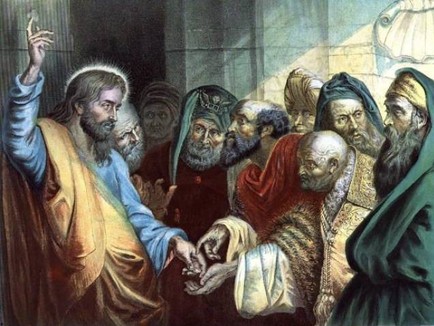
Sunday Readings
1st Reading: Kings 19:4-8
Psalm:
2nd Reading: Ephesians 4:30, 5:2
_Gospel Reading: John 6:41-51_______________________________________
The Jews murmured about Jesus because he said,
"I am the bread that came down from heaven,"
and they said,
"Is this not Jesus, the son of Joseph?
Do we not know his father and mother?
Then how can he say,
'I have come down from heaven?'"
Jesus answered and said to them,
"Stop murmuring among yourselves.
No one can come to me unless the Father who sent me draw him,
and I will raise him on the last day.
It is written in the prophets:
They shall all be taught by God.
Everyone who listens to my Father and learns from him comes to me.
Not that anyone has seen the Father
except the one who is from God;
he has seen the Father.
Amen, amen, I say to you,
whoever believes has eternal life.
I am the bread of life.
Your ancestors ate the manna in the desert, but they died;
this is the bread that comes down from heaven
so that one may eat it and not die.
I am the living bread that came down from heaven;
whoever eats this bread will live forever;
and the bread that I will give is my flesh for the life of the world."
Reflection:
"Murmuring and Disbelief"
In this Sunday, while we are still on the episode of the Bread of Life Discourse (Jn. 6:1-69), this particular part of the Gospel echoes to us the reaction of the Jews on Jesus’ manifestation of himself as the Bread of Life. The Jews reportedly murmured when Jesus manifested himself as Bread of Life. The content of their grumbling is but their faithlessness and distrustfulness to Jesus’ Words. Confidently, they dismissed Jesus’ claim by arguing that he is known as a son of his parents whom they know too well. This grumbling disbelief on their part however does not defeat Jesus’ claim; Jesus is still the Bread from heaven who gives life eternal. The Jews however are in the losing side however because their disbelief is but a perpetuation of their disbelief since the time of Moses. Surprisingly, many of the biblical experts identify the Jews’ murmuring in this context as a reminder of the days of Moses leading these disbelieving Israelites. That murmuring is reminiscent of their attitude towards God and to Moses’ decisions. Their discomforts during the forty years walking in the desert were dotted by series of murmurings and endless complaints against God. Now, as they encounter the Son of God himself – indeed God himself, the Jews has since blinded themselves with their complaints and murmurings. They failed to see in Jesus the promised Messiah and therefore, they failed to behold the one promised since the time of Moses. They keep on missing the point and instead, they settle on complaints and murmuring rather than stepping up towards faith. It is clear that Jesus pointed out to them that the Father will draw them in faith to Him; but it is so unfortunate that they cannot respond to the Father’s invitation because they simply cannot hear the Father’s invitation; what they can hear only is their own murmurings, their endless complains and consequently what they can hear is their disbelief. Who can step out from their own prison of disbelief if what they can hear is their selfish murmuring of faithlessness?
As a challenge, in considering one’s position in the most debated RH Bill today, it is so timely to consider stepping up from the murmur of disbelief and open one’s ear to the other side of the corner.
Contributor:
Fray Ric Anthony Reyes, OSA
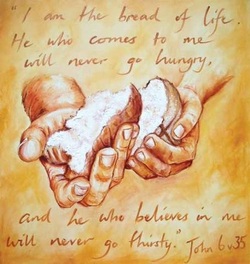 Gospel, John 6:24-35
24 When the people saw that neither Jesus nor his disciples were there, they got into those boats and crossed to Capernaum to look for Jesus. 25 When they found him on the other side, they said to him, 'Rabbi, when did you come here?' 26 Jesus answered: In all truth I tell you, you are looking for me not because you have seen the signs but because you had all the bread you wanted to eat. 27 Do not work for food that goes bad, but work for food that endures for eternal life, which the Son of man will give you, for on him the Father, God himself, has set his seal. 28 Then they said to him, 'What must we do if we are to carry out God's work?' 29 Jesus gave them this answer, 'This is carrying out God's work: you must believe in the one he has sent.' 30 So they said, 'What sign will you yourself do, the sight of which will make us believe in you? What work will you do? 31 Our fathers ate manna in the desert; as scripture says: He gave them bread from heaven to eat.' 32 Jesus answered them: In all truth I tell you, it was not Moses who gave you the bread from heaven, it is my Father who gives you the bread from heaven, the true bread; 33 for the bread of God is the bread which comes down from heaven and gives life to the world. 34 'Sir,' they said, 'give us that bread always.' 35 Jesus answered them: I am the bread of life. No one who comes to me will ever hunger; no one who believes in me will ever thirst.
Reflection:
A THOUGHT FOR THIS SUNDAY’S GOSPEL: Jesus presents himself as the Bread of Life; He is the Bread that will satisfy us and will never leave us hungry. We recognize in the Gospel our role from those who seek Jesus after they were filled by bread from the miracle of the multiplication of loaves. Like them, we want Jesus giving us bread that perishes. In this life, we always come to God to ask for something that will satisfy us temporarily. However, if God does not grant, we are like more those whining Israelites in the first reading today, who are willing still to return to the Egypt just to fill their tummy with bountiful bread and meat mindless if it would cost them to slavery. The figure of our readings today can relate to us as much as we ourselves can sacrifice our relationship with the Lord just to go back to the old enslaving life of sin and illicit pleasures of the world. Our Lord challenges us today in the Gospel: Let us not stop at the mirage of worldly pleasure derived from the perishable bread. Jesus tells us to believe in Him as sent by the Father for the Father has sent the Bread of Life himself; He is the Bread that fulfils every longing; the Word of God that quenches every thirst. We are thus challenged to turn our backs to the old pleasure of perishable bread and to accept in faith Jesus who is the Bread that fulfils in fullness every human existential longing. Happy Sunday and God bless us all!
Contributor:
Fray Ric Anthony Reyes, OSA is 5th year Simply Professed Friar in Augustinian formation. He is currently having his Pastoral exposure in Sta. Ana Sub-parish, Burgos, Siargao Island, Surigao del Norte, Philippines.
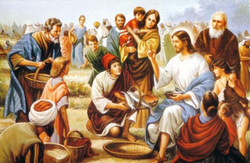
Gospel: John 6:1-15
Five loaves, two fish
Jesus went to the other side of the Sea of Galilee, near Tiberias, and large crowds followed him because of the miraculous signs they saw when he healed the sick. So he went up into the hills and sat down there with his disciples. Now the Passover, the feast of the Jews, was at hand.
Then lifting up his eyes, Jesus saw the crowds that were coming to him and said to Philip, “Where shall we buy bread so that these people may eat?” He said this to test Philip, for he himself knew what he was going to do. Philip answered him, “Two hundred silver coins would not buy enough bread for each of them to have a piece.”
Then one of Jesus’ disciples, Andrew, Simon Peter’s brother, said, “There is a boy here who has five barley loaves and two fish; but what good are these for so many?”
Jesus said, “Make the people sit down.” There was plenty of grass there so the people, about five thousand men, sat down to rest. Jesus then took the loaves, gave thanks and distributed them to those who were seated. He did the same with the fish and gave them as much as they wanted. And when they had eaten enough, he told his disciples, “Gather up the pieces left over, that nothing may be lost.”
So they gathered them up and filled twelve baskets with bread, that is with pieces of the five barley loaves left by those who had eaten.
When the people saw this sign that Jesus had just given, they said, “This is really the Prophet, he who is to come into the world.” Jesus realized that they would come and take him by force to make him king; so he fled to the hills by himself.
Reflection:
Readings
First Reading: 2 Kings 4:42-44
Responsorial Psalm: Psalm 145
Second Reading: Ephesians 4:1-6
Gospel: John 6:1-15
The Gospel for the 17th Sunday in Ordinary Time is taken from John. It is entitled the Multiplication of the Loaves and Fish. What is so interesting about this reading is that it is the only miracle story that appears to all the four Gospels. But, this story finds a significant place in John as it is presented the fourth sign in the so-called Book of Signs (miracles). Certainly, John is a great writer in the sense that he knew where to lead his readers to recognize the focus of his theology, i.e. the revelation of God in the incarnation of the Son.
In this reflection, let me share with you something about Faith. Jesus in the Gospel asked Philip concerning the large crowd that followed them, “Where can we buy enough food/bread for them to eat?” Christ is the Lord. Why in the world would He ask? However, the Evangelist added, “He said this to test him for He Himself knew what he would do.” Christ tested his disciples using the very question of Moses to God in the desert (Num 11:13). The difference is that Moses inquired out of ignorance in total adherence to God while Christ asked in a rhetorical manner to know how the disciple will respond. But Jesus knew what to do.
By Andrew presenting the five barley loaves and two fish a lad has, the disciples were able to prove they do not lack faith by showing him the food they have. The raw materials for the event that followed have been provided: the loaves and fish. Then the miracle-event ensued.
But let us reflect on what Jesus did upon seeing the raw materials out of which he is to perform a miracle. He took the loaves and fish, gave thanks and distributed them to the people. These actions of Christ are not new to us. They prefigure the Last Supper scene and connote the new exodus which will be wrought through Christ. The feeding of the multitude anticipates the Eucharist and looks backward to the feeding of Israel with manna (bread from heaven) in the desert at the time of Exodus (Ex 16) and Elisha’s feeding a hundred men with small provisions (2Kgs 4:42-44). Nevertheless, the actions of Christ communicate and manifest a very important message. It is His unfailing faith to the Father. Never in His life on earth did Jesus doubt His Eternal Father. When He took the loaves and fish, He gave thanks and distributed them He knew that the Father of all (Eph 4:6) will never fail Him for whatever He asks of Him. Thus, the glory of the Son is revealed behind the event.
Brothers, this miracle story, above all, speaks about faith. Jesus tested His disciple’s faith. From which we saw that with faith miracle is possible. We also find the Son of God in total reliance to the divine providence of the Father. Indeed, this is what faith is about.
The mystery that overshadows creation reveals to human comprehension the grandeur of God’s mighty hand. The rich imageries of bread and fish in the Old and New Testaments were touched by the Lord. Simple as they are, Christ made use of them to show us what faith can do and how simple food of simple people can be extraordinary signs of God’s immeasurable love.
Out of God’s overflowing love for sinful humanity HE HAS REVEALED Himself. The zenith of the revelation happened with the incarnation of his only begotten Son. And on our part, as creatures, all we ought to do is to respond through the unconditional ascent of our faith. Hence, the katabatic and anabatic interplay comes into being.
Dear friends, faith is something we possess though unseen. Although we speak of fides et ratio, still faith will always be clothed with mystery. With Mary, let us learn from the most Faithful suffering Servant of all, Christ our Lord. Miracle happens when we give our everything and rely on the benevolence of our Maker with the unconditional ascent of our hearts.
Our holy father Augustine died reciting the penitential psalm while entrusting everything in God’s hand. Let us keep in mind that towards the twilight of our lives what remains in philosophy is reason and in theology, faith. This makes sense as we remember a passage from the Letter to the Hebrews which says, “Faith is the realization of what is hoped for and evidence of things not seen” (Heb 11:1).
The challenge now is how to enrich our faith with action because “faith requires public testimony and commitment” (Porta Fidei, 10) in response to God’s love for us. He has given us His all when Jesus died through the most humiliating death we could ever imagine. And as could and should we not give our all?
Note: This Gospel sharing is shared with the permission of the author, Fray Aimark Asor, OSA. He delivered this sharing before dinner.
A simple theme of the gospel of today is about sharing. The best act of sharing depicted in the gospel is the child bringing the five loaves of bread and two fishes. His example tells us that instead of taking the food for himself and eat it alone and instead of running away, he gave it up.
Here are other themes that we might extract from our gospel in the 17th Sunday in Ordinary Time of July 29, 2012.
1. The Eucharist - when Jesus prayed for the miracle
2. Sacrifice - the boy's action
3. Obedience - when the people reclined
4. prayer - When asking for something from God, pray to him. Jesus did it himself.
5. Good Shepherd - a continuation of the previous Sunday's Gospel, which is about Jesus care for this disciples.
|







 RSS Feed
RSS Feed